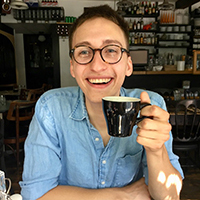
CQE Student Feature
Engineering Quantum Systems (EQuS) group: Chris McNally
Research group name: The Engineering Quantum Systems (EQuS) group
Research Advisor: MIT-CQE Director, MIT Prof. William D. Oliver
Hometown, Country: Boston, Massachusetts, USA
Academic History Prior to coming to MIT: BS in Mathematics and Physics at McGill University in beautiful Montreal, Quebec.
What brought you to MIT? Growing up in Massachusetts, I met a fair number of people who’d been through MIT. It was clear to me that there was something distinctly special about them, and that “MIT people” are the sort of people to emulate. I also attended some memorable ESP programs back then. So, MIT meant something to me from early on. After undergrad, I joined Danielle Braje’s lab at Lincoln Laboratory as assistant staff. She and her team are amazing experimentalists, and I was incredibly lucky to be able to work with and learn from them. Being at Lincoln also brought me into contact with the quantum engineering groups on campus. Not only was their research output inspiring, graduate students from those groups were already some of my colleagues. Their example and help made it seem possible to apply.
What interests you the most about your research? At MIT I’ve been able to collaborate with people from a remarkable range of backgrounds, from condensed matter to programming language theory. Even within the EQuS group–which is focused on superconducting quantum circuits–our research runs from basic materials science to quantum algorithms. That’s what makes Quantum engineering an exciting field to be in today. In part because of the limitations of present-day qubit devices, we have to push in every direction at once. And, for researchers, it’s not enough to have one tool in your belt. I came to MIT as an (apprentice) experimental physicist, but an early devicecalibration project sent me down a deep programming rabbit hole which, in turn, has recently led to some exciting new explorations in computer science proper.
What are your future plans? I recently completed a summer internship at LPS in Maryland as part of the Doc Bedard fellowship program. Not only was it a reprieve from a year-long lockdown, but a welcome interlude before the “back half” of the PhD. It was a great opportunity to discover entirely new research problems. In the long term, I’m undecided between industry, an academic postdoc, or something else entirely. So far in grad school, I’ve had a few opportunities–like the LPS internship–to see “outside,” including a couple of weeks here and there in industry. Academia isn’t all there is to the world, but it’s been very rewarding so far.
